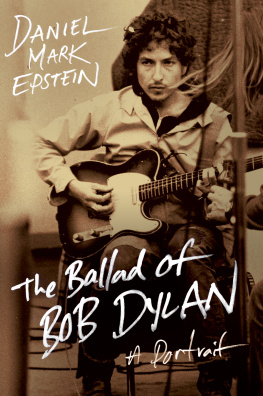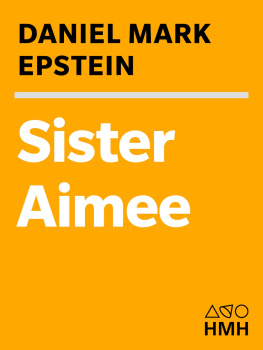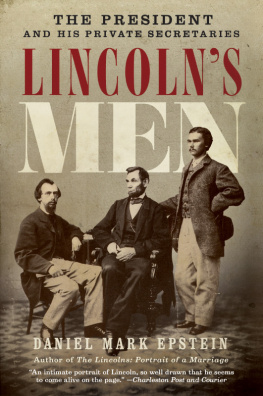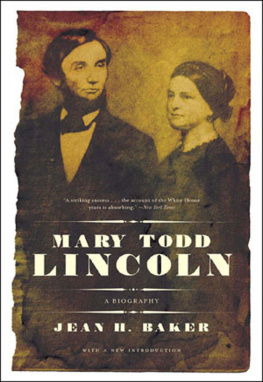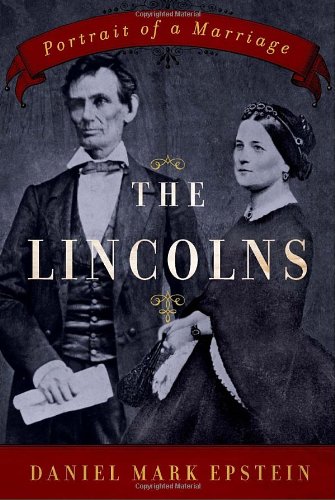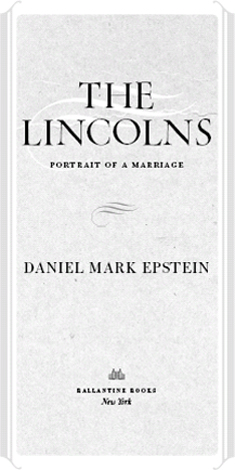REV. SYDNEY SMITH

THE TRYST: SPRINGFIELD, 1842

W ALKING EAST ON JEFFERSON STREET with the setting sun behind him, Abraham Lincoln followed his shadow toward the house on Sixth Street where he had arranged to meet his love in secret.
The tall man cast a long shadow in the November light. The October rains and wind had nearly stripped the trees of their leavesthe maple, the walnut, the oak of the prairie. He liked the trees without their foliage, as their anatomy could then be studied. The outline of a silver maple against the sky was delicate but firm; the network of shades the branches cast upon the ground seemed to him a virtual profile of the tree.
Perhaps a mans character is like a tree, and his reputation like its shadow; the shadow is what we think of it; the tree is the real thing. This idea, which would attend the young man on an eventful journey into middle age, might now provide small comfort. For he had gone and made a fool of himself, during the previous two years of his life, a very public sort of fool at the age of thirty-three.
Now, strolling the wooden planks of a makeshift sidewalk laid along the mud ruts of Jefferson Street, past the new state capitol building with its stately columns and dome upon the square, Lincoln followed his shadow and his reputation toward the home of his friend Simeon Francis, where he could pursue his folly behind closed doors. If a mans character is like the tree and ones reputation like the shadow, he had begun, by trial and error, to understand his character, his virtues and weaknesses; but he still had little sense of what the world might make of his reputation.
He was a secretive man, who kept his own counsel. He was an ambitious man of humble origins, with colossal designs on the future. And it would always be advantageous not to be closely known, never to be transparent. Passing a farmer on a dray, he would tip his hat and grin. Everybody knew him. Nobody knew him. He would play the fool, the clown, the melancholy poet dying for love, the bumpkin. He would take the world by stealth and not by storm. He would disarm enemies by his apparent navet, by seeming pleasantly harmless. He would go to such lengths in making fun of his own appearance that others felt obliged to defend it.
On this November afternoon in 1842 it would hardly seem necessary to argue that he was appealing to women, this lanky, clean-shaven fellow, seeing as how one of the most attractive, nubile ladies of Springfield had singled him out, pursued him, and was now waiting for him in the parlor of that house on the northeast corner of Jefferson and Sixth streets.
The friend who owned the house, Simeon Francis, editor of the Sangamo Journal, and his wife, Eliza, were childless. They made their large home available for Lincoln and his beloved as a trysting place, where they had been meeting since the summer. The inhibitions that attend lovers when they first are alone, speechless, had gradually given way until they found themselves in a situation where marriage was, if not obligatory, inevitable.
LINCOLN KNEW HE had made a spectacle of himself on a grand scale recently, in the newspapers, caught up in a scandalous duelthere were rumors the cause of it was Miss Mary Todd. And now walking on his way to what might be greater imprudence, he could reflect that only a few years earlier he had resolved never again to get into such a scrape.
In 1838, on April Fools Day, he had written a letter to Eliza Browning, wife of his lawyer friend Orville Hickman Browning, in which he had reached the following conclusion: Others have been made fools of by the girls; but this can never be with truth said of me. I most emphatically, in this instance, made a fool of myself. I have now come to the conclusion never again to think of marrying; and for this reason; I can never be satisfied with any one who would be block-head enough to have me. Perhaps he was only joking. He had more masks and poses than Hamlet. This letter explaining his failed courtship of the tall, matronly Miss Owens is scathing comedy, in which he gives vent to feelings of distaste he could not quite conceal in sardonic billets-doux he wrote to the lady herself.
Although I had seen her before, she did not look as my immagination [sic] had pictured her. I knew she was oversize, but she now appeared a fair match for Falstaff; I knew she was called an old maid, and I felt the truth of at least half of that appellation; but now when I beheld her, I could not for the life avoid thinking of my mother; and this, not from withered features, for her skin was too full of fat, to permit its contracting into wrinkles. When he had first glimpsed Miss Owens, she had been twenty-four and pretty, but if Lincoln is to be trusted, the years had not been kind. From her want of teeth, weather-beaten appearance in general, and from a kind of notion that ran in my head, that nothing could have commenced at the size of infancy, and reached her present bulk in less than thirty-five or forty years; and in short, I was not all pleased with her. But what could I do? I had told her sister that I would take her for better or worse.
The match had been made in a playful spirit, on both sides, at the instigation of Miss Owenss sister, Mrs. Bennett Able. But after a while no one could be sure just how serious the agreement had become. Lincoln made it a point of honor to keep his word, especially if others had been induced to act on it, which in this case he thought they had.
I was now fairly convinced, that no man on earth would have her, and hence the conclusion that they were bent on holding me to my bargain. Well, they were not, and he had been mistaken. Miss Mary Owens would marry an excellent husband and have four childrenbut not Lincolns. Knowing his ambivalence, exasperated by his stalling and his convoluted avowals, not of his love but of some deep concern that she might come to grief if he declined to marry her, she relieved him of his suffering by informing him the wedding was not to be.
When he was sure he had heard her correctly, Lincoln was stunned.
I verry unexpectedly found myself mortified almost beyond endurance. My vanity was deeply wounded by the reflection, that I had so long been too stupid to discover her intentions, and at the same time never doubting that I understood them perfectly; and also, that she whom I had taught myself to believe no body else would have, had actually rejected me with all my fancied greatness; and to cap the whole, I then, for the first time, began to suspect that I was really a little in love with her. But let it go. Ill try and outlive it.
That courtshipif one could call it thathad ended. But if he had appeared foolish in his approach to Mary Owens, he made himself look like a lunatic with Mary Todd. He had made a fool of himself not by thinking himself the last chance for a woman he found unattractive, but by falling in love so deeply he lost his wits. He was a romantic figure in a romantic age, regarding himself as a poet and a politician. A follower of Byron and Burns, he had, at thirty, not wholly outgrown his illusions. Who could be more outrageous, more fantastical than an impetuous young man, in love or out, who trusts his heart for guidance rather than his reason?


